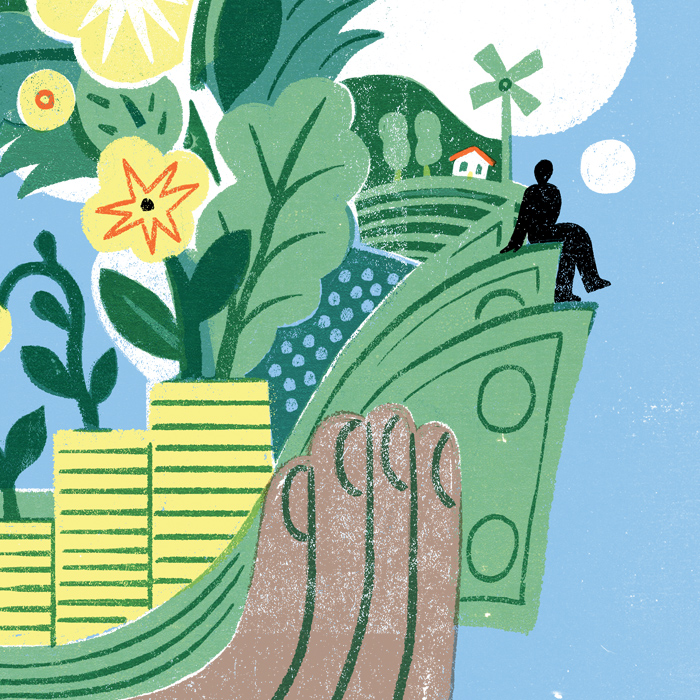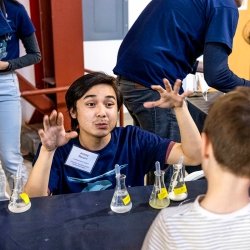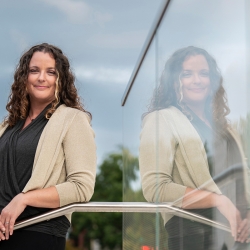
Illustration by Irene Rinaldi
SF State students, alums and faculty are finding innovative ways to invest in earth's future
By Matt Itelson
When it comes to environmental impact, SF State alumni, students and faculty are thinking globally and acting financially. Whether through stocks, bonds, mutual funds, retirement plans or endowments, investors of today demand social responsibility in addition to a financial return.
“Let’s be real. Money and the cost of capital influence corporate decision-making and policy,” says Neil Victor Harvey (B.S., ’23), an inaugural member of SF State’s Sustainable Investment Club. “‘Putting their money where their mouth is’ is the most powerful way an individual and institutional investor can influence corporate interests.”
Based in SF State’s Lam Family College of Business, the club’s student-managed fund focuses on Environmental, Social and Governance (ESG) investment. Seeded with $250,000 from the SF State Foundation, the club invests real money exclusively into companies dedicated to sustainability, social responsibility and ethics. Each student casts a vote on investment decisions following extensive research, presentations and debate. Since beginning in 2022, the fund has achieved highly favorable returns.
“Our primary goal is to build a sustainable portfolio that we can pass on to the next group of club members,” Harvey says. “We are very fortunate to have these resources and capital to work with. Personally, the experience has been incredibly valuable because I’ve had the chance to put all of the theory I’ve been learning in my classes into practice.”
Students may join the club after completing Professor Todd Feldman’s course in ESG investing. He says that the finance profession is no longer just about maximizing returns and minimizing risk. Graduates also need to be prepared to analyze ESG factors.
“We’re not just looking for high return and low risk, but we’re looking to invest in companies that are promoting a sustainable future — and not investing in companies that are doing the opposite,” Feldman says.
Investment vs. divestment
Carlos Davidson, a professor emeritus of Environmental Studies, has focused his activism on a parallel approach: divestment from fossil fuel. In 2013 he joined with student activists to help the SF State Foundation become the first at a public university in the U.S. to divest from coal and tar sands.
This move paved the way for a recently strengthened commitment by the foundation to divest fully from fossil fuels by 2025, in addition to other environmental and racial equity goals.
“San Francisco State can be incredibly proud,” Davidson says. “Now there are public universities all across the country and all across the globe that have done the same thing and followed our lead.”
Davidson is now leading a divestment campaign in the California Public Employees Retirement System (CalPERS), the largest pension fund in America. (SF State employees, including Davidson, are members.) He compares the “morally unacceptable” practices of oil companies to those of big tobacco and South Africa’s apartheid.

“It really took divestment to raise the moral issue to public consciousness,” Davidson says. “Any time our government tries to do anything responsible, they face ferocious pressure from the fossil fuel industry. They’re the biggest obstacle to the world addressing climate change at this point.”
Conversely, Economics Professor Emeritus Philip G. King prefers that investors retain their holdings in fossil fuels, instead using their leverage as shareholders to urge companies to act more responsibly.
“I believe in shareholder activism. If you divest, you’ve basically lost your vote,” says King, a leading economic expert on resilience to climate change who also has worked with the SF State Foundation. “I think owning the big companies and forcing them to be greener will make a bigger difference.”

Green for the green
Jairo Garcia (B.A., ’21), an analyst for the influential international investment company BlackRock, says the grim reality of climate change has changed many investors’ goals. An investment in sustainable business is an investment in a better planet, on top of making money. “We’re all feeling the impact of climate change, so I think a lot of people are waking up to be like, ‘Hey, we’ve got to start acting now,’” Garcia says, adding that BlackRock has identified ESG as a “megatrend.”
At the nonprofit firm Ceres, Morgan LaManna (B.A., ’07) is the director of investor engagements, providing independent ESG analyses. She notes that legislation also drives demand as, for example, clean-air policies at the state levels and the new federal Inflation Reduction Act have jumpstarted economic activity.
“That makes big auto companies change their businesses, and then investors see that,” she says. “It should send signals to their suppliers, their customers, other people in the supply chain: You know that this transition is happening.”
Features

A River Runs Through It
In some ways SF State's best-kept secret, the Sierra Nevada Field Campus is a bastion of science, art and learning in the middle of the wilderness.

Forces of Nature
Through teaching, research, practices, activism and so much more, the University works every day to protect our planet.

In Conversation with Ben Fong-Torres
The legendary journalist and Gator sits down for a talk with alumna Allison Crimmins, director of the federal government's Fifth National Climate Assessment.